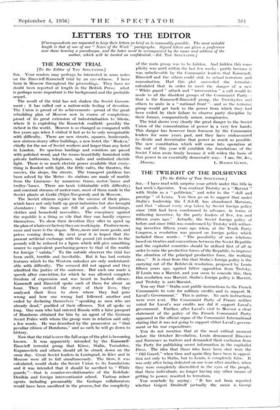THE MOSCOW TRIAL
LETTERS TO THE EDITOR
[Correspondents are requested to keep their letters as brief as is reasonably possible. The most suitable length is that of one of our " News of the Week" paragraphs. Signed letters are given a preference over those bearing a pseudonym, and the latter must be accompanied by the name and address of the author, which will be treated as confidential.—Ed. THE SrEcT_vron.] [To the Editor of THE SPECTATOR.] SIR,—Your readers may perhaps .be interested in some notes on the Zinovieff-Kameneff trial by an eye-witness. I have been in Moscow throughout the proceedings. They have no doubt been reported at length in the British Press; what
is perhaps more important is the background and the probable sequel.
The result of the trial has not shaken the Soviet Govern- ment ; it has called out a nation-wide feeling of devotion. The Union is proud of its achievements—proud of the great rebuilding plan of Moscow now in course of completion ;
proud of its great extension of industrialisation to Silesia, where it is exploiting the Kusnetsk coalfield--possibly the richest in the world. Moscow is so changed as compared with five years ago when I visited it last as to be only recognisable with difficulty. There are new streets, squares, boulevards, new sixteen-storey office buildings, a new hotel, the ' Moskva,' chiefly for the use of Soviet workers and larger than any hotel in London. Its spacious landings and corridors are paved with polished wood, and the rooms beautifully furnished with private bathrooms, telephones, radio and unlimited electric light. There is so much electric power available that every- thing is flooded with light, the little cafés, the theatres, the movies, the shops, the streets. The transport problem has been solved by the Metro—its stations are made of marble from the Caucasus—by numerous trams, motor-'buses and trolley-'buses. There are taxis (obtainable with difficulty) and constant streams of motor-cars, most of them made in the Soviet plants at Gorki (Nijni-Novgorod) and in Moscow.
The Soviet citizens rejoice in the success of their plans, which have not only built up great industries but also brought abundance ; the shops are full of goods, of furnishings, clothes and household necessities. The conspiracy against the republic is a thing so vile that they can hardly express themselves. To show their devotion they offer to speed up the plan of whatever factory they a re working in. Produce more, more and more is the slogan. •More,more and more goods, and prices coming down. By next year it is hoped that the present artificial exchange with the pound (25 roubles to the pound) will be reduced to a figure which will give something nearer to equivalent purchasing-power to that of the rouble for foreign " valuta." To the outside observer the trial has been swift, terrible and inevitable. But it has had certain features which to the Western onlooker are only understand- able with difficulty. The accused did not appeal and they admitted the justice of the sentence. But each one made a speech after conviction, for which he was allowed complete freedom of expression and was heard in hushed silence. Kameneff and Zinovieff spoke each of them for about an hour. They recited the story of their lives, they analysed their lives to show where they had gone wrong and how one wrong had followed another and ended by declaring themselves " speaking as men who are already dead," purified of their offences. Not all spoke so long. One man who had entered Russia with a false passport of Honduras obtained for him by an agent of the German Secret Police with whom the group were in relation said only a few words. He was described by the prosecutor as " that peculiar citizen of Honduras," and as such he will go down to history.
Now that the trial is over the full scope of the plot is becoming known. It was apparently- intended by the Kameneff Zinovieff terrorist group that Kirov, Stalin, Voroshilov, Kaganovitch and others should all be struck down- on the same day. Great Soviet leaders in Leningrad, in Kiev and in Moscow were all to fall simultaneously. The blow, it was calculated, would shake the Soviet Union to its foundations and it was intended that it should be ascribed to " White guards-"—that is counter-revolutionaries of the Kolchak- Denilrin and foreign interventionist school. Various minor agents including presumably the Gestapo collaborators would have been sacrificed in the process, but the complicity of the main group was to be hidden. And hidden this com- plicity was until within the last few weeks—partly because it was unbelievable by the Communist leaders that Kameneff, Zinovieff and the others could sink to actual terrorism and assassination. Had this plot succeeded the terrorist; calculated that in order to meet the danger of a new " White guard " attack and " intervention " a call would be made to all the dissident groups of the Communist Party— that is the Kameneff-Zinovieff group, the Trotskyites and others to unite in a " national front "—and so the terrorist group would get back to the power from which they had been exiled by their failure to observe party discipline by their former, comparatively minor, conspiracies.
The trial shows very clearly the great danger to the Soviet Union of the concentration of power in a very few hands. This danger has however been foreseen by the Communist leaders for some years past, and they have endeavoured to divide and decentralise that power as much as possible. The new constitution which will come into operation at the end of this year will establish the foundations of the Soviet Union more firmly because it will widen the basis of that power in an essentially democratic way.—I am, Sir, &e.,






































 Previous page
Previous page